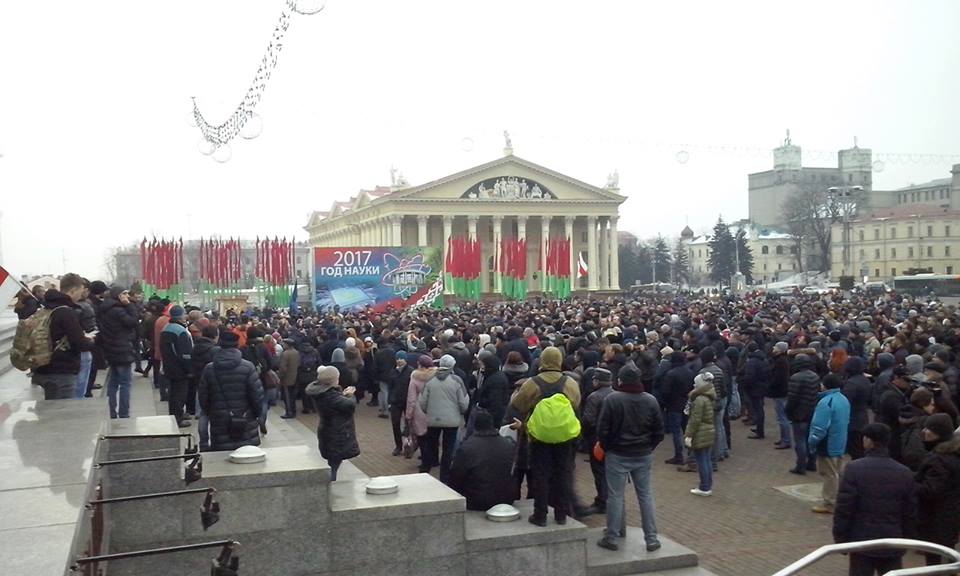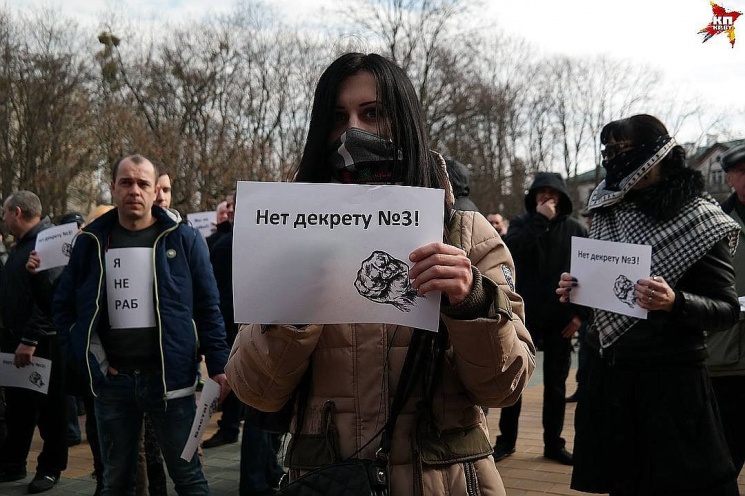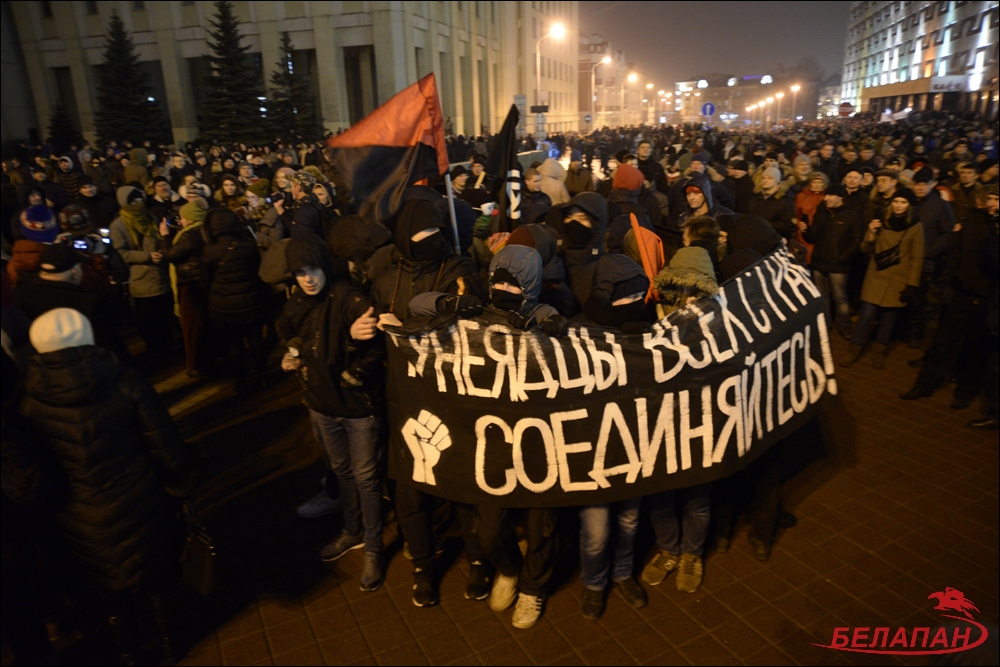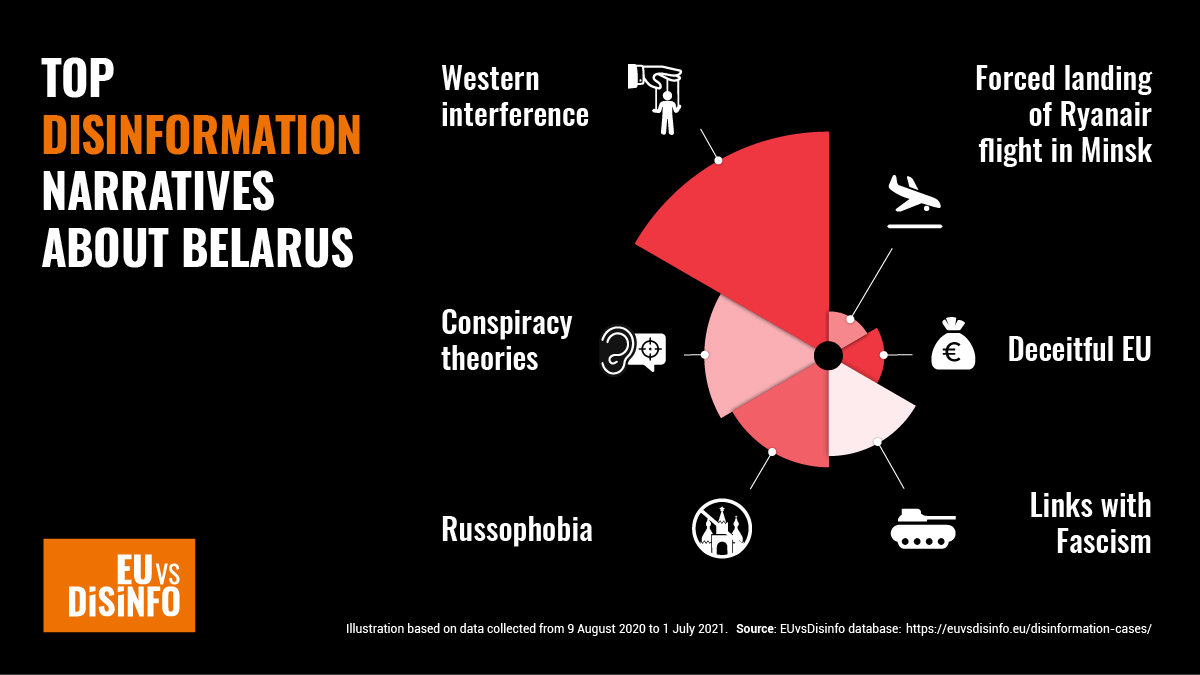Over the past month, a wave of protests against the so -called "decree on social parasites" has rolled over Belarus. In result, hundreds of Belarusians were brutally detained and arrested by representatives of law enforcement agencies who were operating in the streets in civilian clothes, including at rallies sanctioned by the authorities.
During the spring of 2015, amid Russia's economic crisis caused by falling oil prices and the collapse of the Russian ruble, Belarus, a country which is economically dependent upon its eastern neighbor, also underwent bad times. Mass layoffs, a significant reduction in wages and price hikes led to declines in living standards of the Belarusians. One might assume that such a socially-oriented state as Belarus is, according to its President Alyaksandr Lukashenka, should provide maximum support to the socially unprotected strata of the population. However, contrary to all common sense, the President of the Republic issued the Decree No. 3 "On the Prevention of Social Dependence," or "social parasites decree" as it is commonly called, obliging every Belarusian who works less than 6 months during the year to pay a tax of $245. Compulsory social work is envisioned as punishment for non-payment, in addition to the fine.

After the deadline to pay the "parasite tax" was postponed several times, 20 February 2017 was chosen as the final date. The next day it became clear that only one of nine Belarusians were able to pay the money which they had nowhere to earn. Of the 470,000 citizens who received the "letters of happiness," only 51,600 paid the fee. Housewives and young mothers, people with disabilities, villagers, people under layoffs, and even persons who died many years ago were included in the lists of "parasites."
Read also: Tax revolt in Belarus: 90% billed for Lukashenka’s vagrants tax refuse to pay
Noticing the growing discontent of the population, the authorities undertook measures unprecedented by Belarusian standards: high-ranking officials visited the regions and organized open meetings with the public to clarify the situation. Meanwhile, indignant Belarusians began to fill up the courts with complaints. The authorities made a concession, saying that in the case of "special circumstances" a person could be exempted from paying taxes, but each case would be treated individually and the "parasites" would have to further prove their case. And even the fact that Lukashenka issued a decree to temporarily freeze the execution of the order and 400,000 new jobs should be created by April 1, did not calm the enraged people.
In many regional and regional centers, protests took place, gathering thousands of dissatisfied citizens. We must understand that this is an unprecedented activity of the regions, which at best used to travel to the capital earlier, but never so massively organized where they live. It is also noteworthy that, unlike previous years, the shares were held simultaneously under two flags: the official red-green one and the historical one white-red-white one, which now personifies the opposition.
In addition, the protesters were represented by a very diverse audience - something very untypical for Belarus. People aged 40+ are now protesting in the streets, while traditional student activism is much less represented. All this means that it is the ordinary low-income workers, i.e. Lukashenka's past nominal electorate, are at the broken trough.
The adult population with an average or lower than average level of income became the main victim of the decree. If the lack of freedom of speech and the right to a fair trial, illegitimate elections, pressure on opposition politicians, human rights defenders and activists were unable to arouse mass indignation, empty purses were precisely the catalyst that made people think about the fairness of the actions of the authorities.
Read also: Belarus now pregnant with revolution – Lukashenka losing his base in countryside
Realizing how serious the last circumstance is for the "stability" of Belarus, the authorities shifted from a tolerant strategy to an offensive one.
According to the Belarusian human rights center Viasna, law enforcement agencies detained more than 200 people during the protest rallies throughout the country on 3-15 March, including journalists, opposition politicians, activists and ordinary people. Videos appeared in the Internet showing that the detentions were cruelly carried out by persons in civilian clothes who roughly pushed participants into cars without any identification marks, despite the desperate attempts of citizens to protect innocent people.
After a government-sanctioned demonstration held on March 15 in Minsk which was held on its approved route, protesters, including young girls, were caught in public transport and brutally thrown into unidentified cars.
https://www.youtube.com/watch?v=bieyhkicTAc
On the eve of the demonstrations held on 15 March in several cities of Belarus, Lukashenka gave clear instructions to the authorities: "We need to pick out the provocateurs like raisins from a roll." After the demonstrations, the Belarusian National TV Channel compared the "anti-social parasite march" with Nazi processions and asked with rhetorical questions "Do we need this? What do the organizers want? A collapse, like our neighbors have?"
On March 16, the European Parliament expressed deep concern over the continued restriction of the right to freedom of expression and the right to peaceful assembly in Belarus and condemned the detention of independent and opposition journalists and activists in the framework of the adopted document on the EU Priorities for the sessions of the UN Council on Human Rights. At the session of the UN Human Rights Council, the Human Rights Houses Network issued a special statement on the events taking place in Belarus.
Read also: The Belarusian nation has risen against Lukashenka
On March 25, on the anniversary of the proclamation of the Belarusian People's Republic in 1918, the democratically-minded part of the population traditionally celebrates Freedom Day. The authorities of the country do not recognize this holiday and from year to year oppose the event with varying degrees of intensiveness. This year, permission to hold the procession for Freedom Day was refused for formal reasons, but the opposition filed a second application and is awaiting a definitive answer in the near future. But the activists are determined: they will go out into the streets under any circumstances. Obviously, this year the emphasis will be on the "decree on social parasites."
Taking into account the events of the last days, the scenario of brutal dispersal of the procession seems more than likely.
[hr]Editor's note: Lukashenka's crackdown on protests and de-facto return to repressive practices has not received a proper reaction from the West. German and Belgian high-standing diplomats visiting Minsk in the full swing of the repressions had neither postponed the visits nor criticized the government's actions, with Belgium’s deputy prime minister de facto condoning the administrative arrests, according to Igor Gubarevich from the Belarus Digest.
Read also: West’s failure to focus on Belarus protests creating a dangerous situation, Kirillova says
 alina Brodik is a Belarusian human rights activists. Previously, she has coordinated a project to monitor elections in Belarus and Europe. In Ukraine, she has been a coordinator of the LetMyPeopleGo campaign to free Ukrainians illegally held by the Kremlin on political motives.
alina Brodik is a Belarusian human rights activists. Previously, she has coordinated a project to monitor elections in Belarus and Europe. In Ukraine, she has been a coordinator of the LetMyPeopleGo campaign to free Ukrainians illegally held by the Kremlin on political motives.





